In an unprecedented and sharp critique, a US envoy has openly questioned the confidence of the Chinese government, marking a significant departure from the usually cautious diplomatic language employed between the two global superpowers. This rare outburst underscores the escalating tensions between Washington and Beijing, with implications for international relations and global politics.
The Envoy’s Statement
The US envoy, whose identity has not been disclosed, did not mince words during a recent press briefing. "Beijing does not project the image of a confident government," the envoy stated, suggesting that China's actions on the global stage reflect underlying insecurities. This assertion challenges the image that China has been meticulously crafting of itself as a rising and self-assured global power.
Context of the Criticism
This bold statement comes amidst a backdrop of strained relations between the US and China, characterized by disagreements on numerous fronts, including trade, technology, human rights, and territorial disputes. The envoy’s comments appear to be a response to a series of aggressive moves by China, such as its military posturing in the South China Sea, its crackdown on pro-democracy movements in Hong Kong, and its assertive stance towards Taiwan.
Impact on US-China Relations
The envoy’s remarks are likely to add fuel to the already smoldering tensions between the two countries. Beijing has not yet officially responded to the comments, but such direct criticism from a US official is expected to provoke a strong reaction from Chinese authorities. Historically, China has been sensitive to external criticism and has often retaliated with counter-criticisms or economic measures.
Analysis of Beijing’s Confidence
The envoy’s assertion raises important questions about the nature of China's confidence. While China has indeed showcased significant economic and technological advancements, it has also exhibited behaviors that some analysts interpret as signs of insecurity. These include strict control over information, suppression of dissent, and assertive international policies that often draw international condemnation.
Broader Implications
This development could have broader implications for international relations. The US envoy’s comments might signal a shift towards a more confrontational approach in US diplomacy towards China. Such a shift could influence other countries' strategies and policies, potentially leading to a more polarized international community.
Conclusion
The US envoy’s rare and sharp critique of China highlights the increasing complexity and volatility in US-China relations. By labeling Beijing as an insecure government, the envoy has brought to the forefront a critical perspective that challenges the prevailing narratives about China’s global ascent. As the world watches how China responds, the implications of this diplomatic move will unfold, potentially reshaping the geopolitical landscape.



Member discussion: